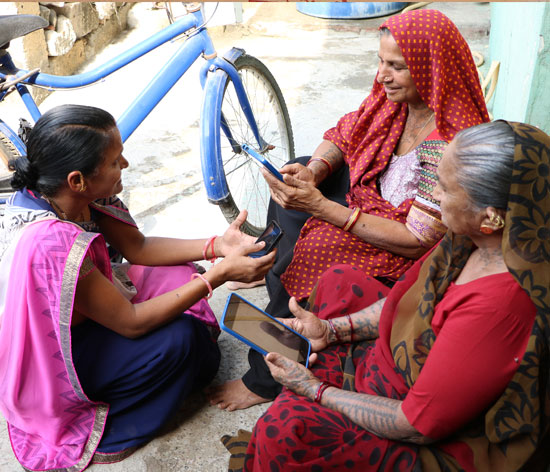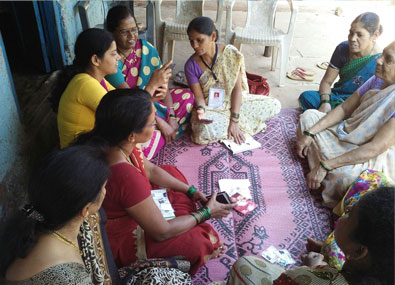
Rohini Sandeep Shirke runs a small bee-keeping unit in Adulpeth village in Satara, Maharashtra. When she began her small business in 2014, she sold the honey to her neighbours, friends and relatives. “I used to sell 25 to 50 bottle of honey a year,” she says. All that changed in 2016, when she was introduced to the Tata Trusts’ Internet Saathi Programme (ISP).
The Trusts launched this digital awareness programme in 2015, in collaboration with Google India, to address the huge online gender gap in rural India. Women were trained to use the internet and equipped with data-enabled devices and the ‘saathis’, as they are called, went on to work as trainers to help other women in their villages begin their digital journey.
Heralding a new era
Rohini had never even touched a smart phone until she began her training as an Internet Saathi. Since then, however, she has been actively using the internet to grow her business by leaps and bounds. Rohini was able to learn about the best practices in beekeeping and honey collection online. She has created an email id and a WhatsApp account so she could promote her product and sell it online; now, she is busy creating a website to boost her business further. “I sold 500kg of honey this year,” she says, smiling.

As a ‘saathi’, Rohini travels to neighbouring villages to train other women in internet usage. She feels they lack awareness and knowledge to make the right choices, and believes that the internet will fill the gap. These trips have also helped Rohini to engage with people, convince them about the quality of her product, and create a strong network.
That is not all – Rohini has learnt the ropes of net banking; she promotes its use among the other women as well. She has also helped other women expand their small business such as poultry using the internet. Women engaged in stitching or offering beautician services are now seeking her help to grow their businesses.
Agent for change
Her training as an Internet Saathi has changed Rohini in other ways – she is now associated with around 10 self-help groups in her village and manages the account books for all of them. She also works as an entrepreneur under the Trusts’ supported programme implemented by Dharma Life, which promotes social impact products and services in her village. She has already sold four water purifiers, six solar lights and has taken orders for induction cooktops. Not only that, she’s creating awareness of clean energy and indoor pollution in her village. “When I went to the villages nearby, I realised just how remained to be done in terms of development in my village,” she says.
Rohini is very popular in her village and in the neighbouring areas, and the women nominated her to contest the village elections for the post of sarpanch. Unfortunately, she lost, but Rohini is undaunted. “I wanted to be the sarpanch so I could do something good for the women in my village,” she says. “I intend to pursue it again next year.” Rohini is committed to bring change to her village, especially for the women who are at the bottom of the pyramid.
The Trusts’ plan is to help Rohini – and other women like her – bring about that change. As ISP expanded to cover 13.5 million women in 130,000 villages in 13 states, grassroots empowerment took on new meaning. The women’s enterprising natures and their passion for positive change has just taken off on a digital journey that will empower them to be agents of change in their communities. And the Trusts are there to support them.
